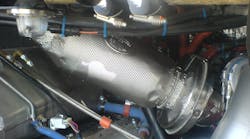A clean fuel storage tank ensures that the highest quality of fuel is ready for use in vehicles. Not only does high-quality fuel keep trucks on the road, it reduces the costs and downtime that can be associated with engine breakdown and repairs, negatively impacting a fleet’s bottom line due to added expenses and reduced productivity.
When it comes to fuel storage, today's more expansive range of fuel formulations presents many challenges for a fleet,” says Peter J. Cochefski, director at Ryder Fuel Services, a provider of fuel management programs that is a subsidiary of Ryder System. “One of the most significant is that the new fuels, such as ultra low sulfur diesel (ULSD), are more prone to contamination.”
Ryder (www.ryder.com) is a provider of commercial transportation, logistics and supply chain management solutions.
CONTAMINATION
The two most common contaminants in fuel – excessive dirt and water – are typically introduced into fuel during the transportation, delivery, mixing or storage processes, notes Cochefski.
“Water, the most common contaminant, may be introduced when moist air condenses on the fuel tank walls and condensation builds up within the tank, with this water working its way into the fuel mixture,” he explains. “Fuel that contains excessive levels of water can see a reduction in its lubricating qualities. This can cause injector seizure and engine damage, in the process, sidelining the vehicle while the necessary – and costly – repairs are performed.
“Fungus and bacteria live in water” he adds. “When these organisms enter a fuel system they can affect sensitive rail injectors in diesel engines and plug fuel filters, reducing their life and causing premature wear, all of which affect the life expectancy and overall on-road performance of the vehicles.”
Particles of dirt, sediment and other solids have a similar effect on fuel injectors, causing them to wear out prematurely and leading to costly engine or fuel system failures, says Cochefski. Today’s high-pressure rail injectors, which are standard components on most heavy duty, diesel-powered transport trucks, “are especially vulnerable to clogging from dirt and contaminants.”
A NECESSITY
Ryder’s Cochefski stresses that fuel tank cleaning is a necessary part of fuel storage tank management. As such, the implementation of a proper fuel tank cleaning program and schedule is one of the most important things the owner or operator of an underground or aboveground fuel storage tank terminal can do to keep the fuel performing properly and the fleet rolling along.
“Over time, fuel storage tanks can accumulate particulates and moisture from repeated filling procedures,” he says. “These particulates and moisture can significantly impact the performance of the fuel and, by extension, the fleet’s engines.”
Ensuring that the fuel remains as clean and contaminant-free as possible also creates a series of added benefits which allow a fleet to operate at peak efficiency for longer periods of time. Among them he cited:
- Improved fuel economy.
- Longer vehicle component life.
- Reduction in the replacement frequency of fuel filters and injectors and the need for engine maintenance.
- Prolonged injector life.
“The first step in guaranteeing that your fleet spends more time on the road and less in the maintenance bay is making sure that the fuel that powers it is of the highest quality possible,” concludes Cochefski.





